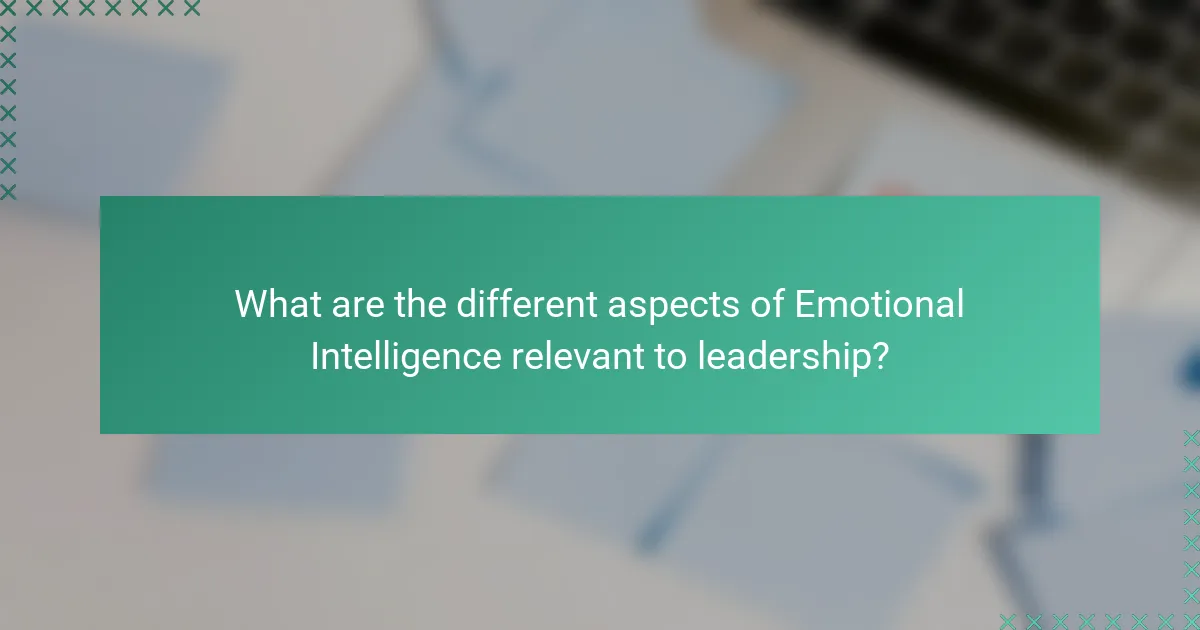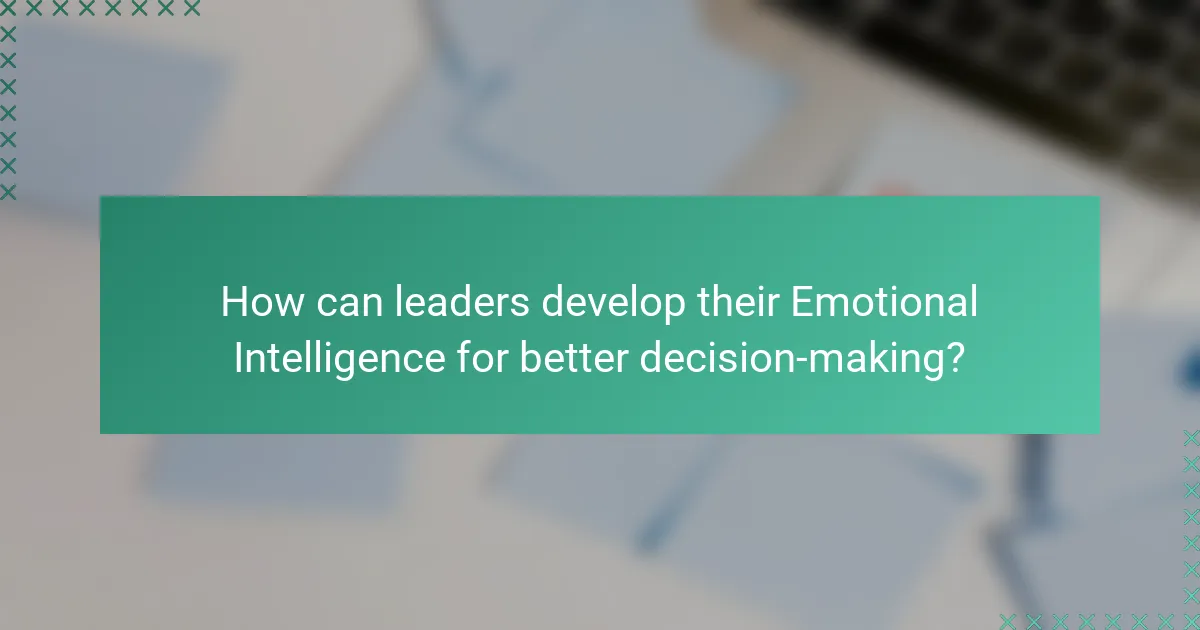Emotional Intelligence (EI) is a pivotal factor in leadership decision-making, encompassing skills such as self-awareness, self-regulation, motivation, empathy, and social skills. Leaders with high EI can effectively manage their own emotions and understand the feelings of their team members, which enhances communication and conflict resolution. Research indicates that these emotionally intelligent leaders are more capable of making decisions that positively impact team dynamics and performance. Furthermore, EI can be developed through practices such as self-reflection, empathy training, and feedback from peers, ultimately leading to improved leadership effectiveness and a more positive workplace environment.

What is the role of Emotional Intelligence in Leadership Decision-Making?
Emotional Intelligence (EI) plays a critical role in leadership decision-making. EI enables leaders to understand and manage their own emotions. It also allows them to empathize with others’ feelings. These skills enhance communication within teams. Leaders with high EI can navigate conflicts more effectively. They make decisions that consider the emotional impact on their team. Research shows that emotionally intelligent leaders foster better team performance. A study by Goleman indicates that EI is a key factor in effective leadership. Leaders with EI are more likely to inspire and motivate their teams.
How does Emotional Intelligence influence leadership effectiveness?
Emotional Intelligence (EI) significantly enhances leadership effectiveness. Leaders with high EI can better understand and manage their own emotions. They also recognize and influence the emotions of others. This ability fosters strong relationships and trust within teams. Research shows that leaders with high EI are more adaptable to change. They demonstrate better conflict resolution skills. A study by Goleman (1998) highlights that EI accounts for up to 70% of leadership success. Effective leaders inspire and motivate their teams through emotional awareness. This results in improved team performance and satisfaction.
What are the key components of Emotional Intelligence in a leadership context?
Self-awareness, self-regulation, motivation, empathy, and social skills are key components of Emotional Intelligence in a leadership context. Self-awareness allows leaders to recognize their emotions and understand their impact on others. Self-regulation involves managing emotions and impulses effectively. Motivation drives leaders to pursue goals with energy and persistence. Empathy enables leaders to understand and respond to the emotions of their team members. Social skills facilitate effective communication and relationship-building. Research by Goleman (1995) highlights these components as essential for effective leadership and decision-making.
How do leaders with high Emotional Intelligence approach decision-making?
Leaders with high Emotional Intelligence (EI) approach decision-making by integrating emotional awareness into their processes. They recognize their own emotions and the emotions of others. This awareness informs their choices, leading to more empathetic and effective decisions. High EI leaders prioritize collaboration and seek input from team members. They foster an inclusive environment, valuing diverse perspectives. Research shows that emotionally intelligent leaders achieve better team performance and satisfaction. For example, a study by Goleman (1998) highlights how EI contributes to improved workplace dynamics. This ability to connect with others enhances trust and communication, essential for effective decision-making.
Why is Emotional Intelligence important for effective decision-making?
Emotional intelligence is important for effective decision-making because it enables individuals to understand and manage their emotions and those of others. This understanding fosters better communication and collaboration. Emotionally intelligent leaders can assess situations more accurately. They can also navigate complex interpersonal dynamics. Research shows that leaders with high emotional intelligence make more informed decisions. A study by Goleman (1995) found that emotional intelligence contributes to 90% of what sets high performers apart. This highlights its critical role in enhancing decision-making processes.
What impact does Emotional Intelligence have on team dynamics?
Emotional Intelligence significantly enhances team dynamics. It fosters better communication among team members. This leads to improved collaboration and trust within the group. Teams with high Emotional Intelligence are more adept at conflict resolution. They can manage stress and adapt to change more effectively. Research shows that teams with higher Emotional Intelligence perform better in problem-solving tasks. A study by Dr. Daniel Goleman highlights that Emotional Intelligence contributes to a positive work environment. This ultimately increases overall team productivity and satisfaction.
How does Emotional Intelligence affect conflict resolution in leadership?
Emotional intelligence significantly enhances conflict resolution in leadership. Leaders with high emotional intelligence can recognize and understand their own emotions and those of others. This awareness allows them to manage conflicts more effectively. They can empathize with team members, facilitating open communication. Empathy fosters a collaborative environment, reducing tension during disputes. Research shows that emotionally intelligent leaders are better at negotiating resolutions. A study by Goleman (1998) indicates that leaders with high emotional intelligence can achieve better outcomes in conflict situations. Their ability to regulate emotions helps maintain a positive atmosphere. This ultimately leads to more constructive solutions and improved team dynamics.

What are the different aspects of Emotional Intelligence relevant to leadership?
Emotional Intelligence (EI) in leadership encompasses self-awareness, self-regulation, motivation, empathy, and social skills. Self-awareness allows leaders to recognize their emotions and how they affect others. Self-regulation helps leaders manage their emotions and impulses effectively. Motivation drives leaders to achieve goals with a positive attitude. Empathy enables leaders to understand and respond to the emotions of others. Social skills facilitate effective communication and relationship-building. Research by Goleman (1995) indicates that leaders with high EI outperform their peers in decision-making and team dynamics.
How do self-awareness and self-regulation contribute to leadership decisions?
Self-awareness and self-regulation significantly enhance leadership decisions. Self-awareness allows leaders to understand their emotions and how these affect their decision-making. This understanding helps leaders identify biases and make more objective choices. Self-regulation enables leaders to manage their emotional responses in high-pressure situations. By controlling impulses, leaders can maintain clarity and focus on long-term goals. Research indicates that leaders with high emotional intelligence, which includes self-awareness and self-regulation, are more effective in their roles. For example, a study by Goleman (1998) found that emotional intelligence is a key predictor of leadership success. Thus, self-awareness and self-regulation foster better decision-making by promoting emotional clarity and rational thinking.
What techniques can leaders use to enhance their self-awareness?
Leaders can enhance their self-awareness through several techniques. One effective technique is mindfulness meditation. This practice helps leaders focus on their thoughts and emotions. It promotes a deeper understanding of their reactions and behaviors. Feedback from peers and subordinates is another crucial method. Regularly seeking constructive criticism allows leaders to see themselves from different perspectives. Journaling is also beneficial. Writing about daily experiences fosters reflection on actions and decisions. Additionally, personality assessments can provide insights into personal traits. Tools like the Myers-Briggs Type Indicator help leaders understand their strengths and weaknesses. Engaging in coaching or mentoring relationships can further enhance self-awareness. These interactions offer guidance and external viewpoints. Research shows that self-aware leaders make better decisions and foster positive workplace environments.
How does self-regulation influence decision outcomes?
Self-regulation significantly influences decision outcomes by enabling individuals to manage their emotions and impulses. This ability allows leaders to remain calm and focused during high-pressure situations. Research shows that leaders with strong self-regulation are better at evaluating options objectively. They can delay gratification, leading to more thoughtful and strategic decisions. A study by Gross (2015) published in “Emotion” indicates that self-regulation enhances problem-solving skills. This results in improved decision quality and effectiveness. Ultimately, self-regulation contributes to more favorable outcomes in leadership decision-making.
What role does empathy play in leadership decision-making?
Empathy plays a crucial role in leadership decision-making by fostering understanding and connection among team members. Leaders who demonstrate empathy can better gauge the emotions and needs of their employees. This understanding leads to more informed and compassionate decisions. Empathetic leaders are often more successful in conflict resolution. They create an environment of trust, which enhances team collaboration. Research indicates that organizations with empathetic leadership see increased employee engagement and satisfaction. According to a study published in the Journal of Business and Psychology, empathetic leaders can improve team performance by 20%. Thus, empathy is essential for effective leadership and decision-making.
How can empathetic leaders improve team performance?
Empathetic leaders can improve team performance by fostering a supportive and understanding work environment. They listen actively to team members’ concerns. This practice enhances trust and communication within the team. Research indicates that teams with empathetic leaders report higher job satisfaction. In turn, this leads to increased productivity and collaboration. A study by the Center for Creative Leadership found that emotional intelligence positively correlates with team effectiveness. Empathy allows leaders to recognize and address individual team members’ needs. Consequently, this personalized approach can reduce conflict and improve morale.
What are the challenges of practicing empathy in leadership?
Practicing empathy in leadership presents several challenges. One significant challenge is emotional fatigue. Leaders may experience burnout from constantly engaging with others’ emotions. Another challenge is maintaining objectivity. Empathy can cloud judgment and lead to biased decision-making. Additionally, time constraints hinder empathetic interactions. Leaders often feel pressured to prioritize tasks over personal connections. Resistance from team members can also be a barrier. Some individuals may perceive empathy as weakness or manipulation. Furthermore, cultural differences complicate empathetic communication. Diverse teams may have varying expectations of empathy. Finally, balancing empathy with accountability poses a challenge. Leaders must hold team members accountable while remaining supportive. These challenges highlight the complexity of integrating empathy into effective leadership.

How can leaders develop their Emotional Intelligence for better decision-making?
Leaders can develop their Emotional Intelligence (EI) through self-awareness, practice, and feedback. Self-awareness involves recognizing one’s emotions and their impact on decision-making. Practicing empathy helps leaders understand others’ feelings and perspectives. Engaging in reflective practices, such as journaling, can enhance self-regulation. Seeking feedback from peers and mentors provides insights into emotional responses. Training programs focused on EI skills can also be beneficial. Research shows that higher EI correlates with improved leadership effectiveness. A study by Goleman (1998) highlights that leaders with strong EI make better decisions and foster positive workplace environments.
What strategies can leaders employ to improve their Emotional Intelligence?
Leaders can improve their Emotional Intelligence by practicing self-awareness. This involves recognizing their own emotions and understanding how they affect their behavior. Regular reflection on personal experiences can enhance this awareness. Additionally, seeking feedback from peers can provide insights into emotional responses.
Another strategy is to develop empathy. Leaders should actively listen to team members and validate their feelings. Engaging in conversations about emotions can strengthen this skill. Furthermore, practicing emotional regulation is crucial. Leaders must learn to manage their emotions in stressful situations. Techniques such as mindfulness can aid in maintaining composure.
Finally, building strong relationships is essential. Leaders should invest time in connecting with their team. Strong interpersonal bonds can enhance emotional understanding. Research shows that leaders with high Emotional Intelligence foster better team dynamics and decision-making.
How does feedback from peers enhance Emotional Intelligence?
Feedback from peers enhances Emotional Intelligence by providing insights into one’s emotional responses. This feedback helps individuals identify strengths and weaknesses in their emotional awareness. Peer observations can highlight blind spots that one may not recognize independently. By receiving constructive criticism, individuals can improve their empathy and interpersonal skills. Research shows that peer feedback fosters self-reflection, which is crucial for emotional growth. A study by Goleman (1998) indicates that social feedback is vital for developing emotional competencies. Therefore, peer feedback is essential in cultivating a higher level of Emotional Intelligence.
What role does continuous learning play in developing Emotional Intelligence?
Continuous learning significantly enhances Emotional Intelligence (EI). It allows individuals to acquire new perspectives and skills. This ongoing process fosters self-awareness, a core component of EI. By engaging in continuous learning, individuals can better understand their emotions and reactions. Additionally, it promotes empathy, enabling individuals to connect with others more effectively. Research shows that leaders who commit to lifelong learning exhibit higher EI. This correlation is evident in improved decision-making and interpersonal relationships. Continuous learning thus serves as a vital mechanism for developing and refining Emotional Intelligence.
What best practices can leaders follow to leverage Emotional Intelligence in decision-making?
Leaders can leverage Emotional Intelligence in decision-making by practicing self-awareness, empathy, and effective communication. Self-awareness allows leaders to understand their emotions and how they influence decisions. Empathy helps leaders recognize and consider the feelings of others, leading to more inclusive choices. Effective communication ensures that leaders articulate their decisions clearly and foster open dialogue. Research shows that leaders with high emotional intelligence create more cohesive teams. According to a study published in the Journal of Organizational Behavior, emotionally intelligent leaders enhance team performance by 20%. This illustrates the tangible benefits of applying Emotional Intelligence in leadership decision-making.
How can leaders create a culture of Emotional Intelligence within their teams?
Leaders can create a culture of Emotional Intelligence by promoting self-awareness and empathy among team members. They should encourage open communication to foster trust. Training programs focused on Emotional Intelligence can also be implemented. Regular feedback sessions help in recognizing and addressing emotional dynamics. Leaders must model Emotional Intelligence themselves to set an example. Research shows that teams with high Emotional Intelligence perform better and have higher job satisfaction. A study published in the Journal of Organizational Behavior found a direct link between Emotional Intelligence and team performance.
What common pitfalls should leaders avoid when applying Emotional Intelligence?
Leaders should avoid several common pitfalls when applying Emotional Intelligence. One major pitfall is neglecting self-awareness. Leaders must understand their own emotions to effectively manage them. Another pitfall is failing to recognize the emotions of others. Ignoring team members’ feelings can lead to miscommunication and conflict. Additionally, leaders may struggle with over-reliance on emotional responses. This can result in decisions that lack objectivity. A further pitfall is inconsistent application of Emotional Intelligence. Leaders should apply emotional skills uniformly to build trust. Lastly, some leaders may underestimate the importance of empathy. Empathy fosters strong relationships and enhances team cohesion. These pitfalls can hinder effective leadership and decision-making.
What are the practical outcomes of integrating Emotional Intelligence in leadership decision-making?
Integrating Emotional Intelligence (EI) in leadership decision-making leads to improved team collaboration and enhanced employee satisfaction. Leaders with high EI can understand and manage their own emotions, as well as empathize with others. This capability fosters a positive work environment. Research shows that emotionally intelligent leaders are more effective in conflict resolution. They can navigate difficult conversations with sensitivity, leading to better outcomes. Additionally, EI contributes to better decision-making by considering the emotional impact on team members. A study by Goleman et al. (2002) highlights that organizations with EI-focused leadership experience higher productivity and reduced turnover rates. Thus, EI integration in leadership is linked to tangible benefits in organizational performance.
The main entity of the article is Emotional Intelligence (EI) and its impact on leadership decision-making. The article explores how EI enhances leadership effectiveness through self-awareness, self-regulation, empathy, and social skills, leading to better communication, conflict resolution, and team dynamics. It highlights research findings that demonstrate the correlation between high EI and improved decision-making outcomes, team performance, and employee satisfaction. Additionally, the article discusses strategies for leaders to develop their EI and create a culture that fosters emotional intelligence within their teams.
